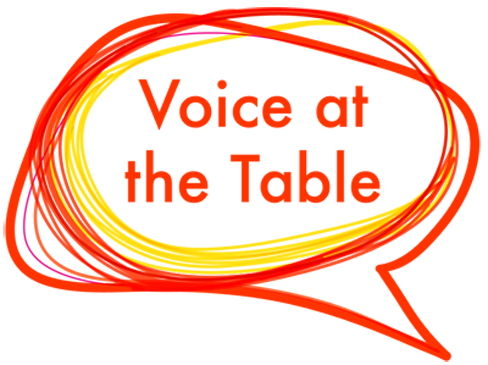Advocate and VaTT graduate Julyne, tells her story
“If they don’t listen to us – then they are not going to learn what is important to us” Susan Arthur and Members of Reinforce Self Advocacy Group talk about why Voice at the Table is so important” text-by=”Reinforce talk Voice at the Table”
About Voice At The Table (VATT) Training
Profile – Voice At The Table Facilitator – Julie Brasington
Brain Injury Matters Talk About VATT
Talking about Voice at the Table – Brain Injury Matters
How does Voice at the Table help people with an acquired brain injury?
In March 2016, Members of “Brain Injury Matters”, a self advocacy group for and by people with an acquired brain injury, took part in the first ever Voice at the Table training. The training has had a lasting impact. Francesca Lee said “Before I did the course I was very insecure and scared to speak up, I was embarrassed at the way I spoke”. In the years since the training, her life has changed. “I’ve done many speeches. I’ve been on committees and I’ve also travelled around Australia and spoken in public and that has given me so much confidence.”
But Voice at the Table isn’t just about building the capacity of people with disabilities. It is also a project dedicated to redressing the barriers that people with a cognitive disability face when trying to have their say. Troy Huggins said “I’ve been involved in meetings where I was treated as a token. Basically just there for the scenery. People were asked questions either side of me, but I wasn’t addressed.” The language that is used in meetings and the way a meeting is conducted can have a big affect too. Francesca Lee said “they start talking all their jargon and you’re not really understanding properly what’s going on. It can make me feel very hopeless and just not respected in the group.”
Voice at the Table offers inclusion training and resources for Government Departments and Community organisations who want to ensure people with disabilities have a real and equal say in decision-making. Francesca Lee, who has facilitated training for TAC staff says, “I think it’s excellent if Government do it because they get to see exactly how it is for people with a disability and they can hopefully learn to be a bit more inclusive.” Peta Ferguson adds, “our opinion is so important. The lived experience is necessary.”
Why VATT Is Important
“If they don’t listen to us – then they are not going to learn what is important to us”
Susan Arthur and Members of Reinforce Self Advocacy Group talk about why Voice at the Table is so important
Reinforce talk Voice at the Table
Case Study – Disability Services Commissioner
In 2018 Voice at the Table worked with the Office of the Disability Services Commissioner on a new project about abuse prevention in the sector.”
In June 2018, the Disability Services Commissioner (DSC) commenced a participatory based research project looking at building safe and respectful cultures in disability services as part of our broader abuse prevention strategy.
After seeing Voice at the Table (VATT) graduates present at a National Disability Insurance Scheme (NDIS) forum, they were challenged regarding their inclusive practices of co-design within the project. They approached VATT to assist them in engaging four people with disability onto either our Project Advisory Group (PAG) or as paid Community Researchers. Members of the PAG participated in the VATT training day and the ‘Top ten tips for inclusive meetings’ were incorporated into all aspects of our PAG and Community Researcher training sessions.

“As a result of our engagement with VATT, the final outcome of the research project was far richer than we had ever expected. The VATT members added a value and depth of insight that we would have been unable to gather had we relied upon our internal resources alone. They also connected with all research participants on a unique level by offering a lived perspective of disability service provision, all the while presenting with professionalism and sensitivity to the stories that were shared with them.
DSC as an organisation, along with other organisations who participated in the PAG, have gained valuable skills regarding inclusion that will not only be incorporated in future meetings but in all aspects of our work practices and community engagement.
We thank VATT for their dedication and patience in working with organisations to be truly inclusive.”
Samantha Dooley, Manager, Capacity Development Team, Disability Services Commissioner
Case Study – VCOSS
In 2018, VCOSS worked with Voice at the Table to include people with disabilities to oversee a new project.
In 2018, Victorian Council of Social Service (VCOSS) started work on a new project, Strengthening Sector Resilience. The project aims to support Victorian disability organisations to be user-led and well-positioned for the future.
Given that a key focus of the project is working with organisations to promote user leadership in their boards and governance committees, VCOSS recognised the importance to lead by example with the management of their own project governance. They decided to include a number of people with disabilities on the project advisory group (later renamed the project ideas group) and they consulted with Voice at the Table to help set it up to be truly inclusive.

“I gave Mike at Voice at the Table a call and had a chat about what we were looking for. Voice at the Table helped us to seek interest for who’d like to be involved.”
Maeve Kenedy VCOSS
Working with Voice at the Table
After an EOI process, three Voice at the Table graduates were appointed to the committee. Voice at the Table then ran an inclusive practice workshop for the new committee. Maave Kennedy said “the very first time that our whole group got together was at the Voice at the Table training about inclusive meeting practice.”
One of the VATT Top Ten Tips is to roll out the welcome mat. People with cognitive disabilities can feel intimidated when attending committees for the first time. VATT graduate and Self Advocate Heather Smyth said that the workshop helped break the ice and set up inclusive ways of working. “We didn’t know each other that well but as the day went on everyone spoke, we played a couple of games and did other activities. So we got to know each other a little bit better”.
In addition to the inclusive practice workshop, VCOSS drew on resources and advice from Voice at the Table. Maeve Kennedy from VCOSS said that this “really shaped the way that we’ve approached with working with the ideas group.” The resources and practices don’t just ensure that people with cognitive disabilities have a real and equal voice at the table, they benefit everyone involved. Maave said, “It’s not just about things that work for people with cognitive disabilities. These things really make meeting experiences better for everybody.”

“The meetings have been very good. People listen and we all have respect for each other. A lot of value is coming out of it”
Roger Astell VATT graduate and Self Advocate

“I feel that I’ve been included and actually listened to and taken seriously.”
Heather Smyth VATT graduate and Self Advocate

“It’s really adding a lot of richness and value to our project and I don’t think it would have been the same without it”.
Maeve Kennedy VCOSS
Meetings - The Good, The Bad and the Ugly (5-minute version)
About the Film
Starring experienced Self Advocate, Colin Hiscoe and “experienced bureaucrat” Michael Cromey this short film takes a fun look at what makes a meeting truly inclusive for people with intellectual disabilities. In the role of Joe, Colin’s final monologue sums it up;
“Imagine a meeting where I’m not patronised, ignored or treated differently, where everyone uses plain English and take my opinions seriously. I just wish I could be a part of a meeting like that.”
In the scenes with Michael Cromey’s character, Chair Montgomery, Colin says “the way the person with a disability was treated they had no say, no voice, no nothing”. Does that happen in real life? “I think I’m lucky because I’ve done the Voice at the Table training and meetings aren’t that bad. It still does happen. I sometimes worry – when you notice someone not saying anything – maybe we should ask them”. Colin has appeared in many films over the years. He says “it was good to be an actor again, but it was hard having to re-shoot things over and over.”
Click to read our tips for consumer participation and running inclusive meetings
Click to learn More About Victorian Public Sector Boards and Committees Initiative
Case Study – Safer Care Victoria
In March 2018 Safer Care Victoria held a workshop with consumers and people involved in healthcare to help identify the top priorities and guide the development and implementation of the Partnering in Healthcare Framework. Voice at the Table supported Safer Care Victoria to include consumer advocate, Francesca Lee as a participant on the day.
Belinda Macleod-Smith, Consumer Project Lead for Safer Care’s Consumers as Partners Branch said “I felt a particular responsibility to include groups that I knew are generally excluded from things like this”.
The previous stage of consultation involved an online survey. Around 700 Victorians completed the survey and it generated lots of valuable feedback but researchers noted that there was limited diversity represented by those who participated. Belinda said, “as a Government agency we have a commitment and its actually within our roles and duties to make sure that what we’re doing meets the needs of all members of our community”.
Voice at the Table provided Safer Care Victoria with advice and resources such as the Top Ten Tips Sheets to help them prepare to make the workshop inclusive and accessible. Safer Care Victoria ensured that travel and access needs were paid for all consumers who attended. This included providing an independent inclusion support person to attend with Francesca Lee and meet with her before the event to review the background materials and help prepare.
Consumer advocate, Francesca Lee reflected that the event was very inclusive and that, unlike other events, the information was easy to understand and the conversation was easy to follow. Having an inclusion support person there also helped give her the confidence to speak up. “It’s something that I have so much passion for and being in hospital myself for so long can contribute so many things”.
